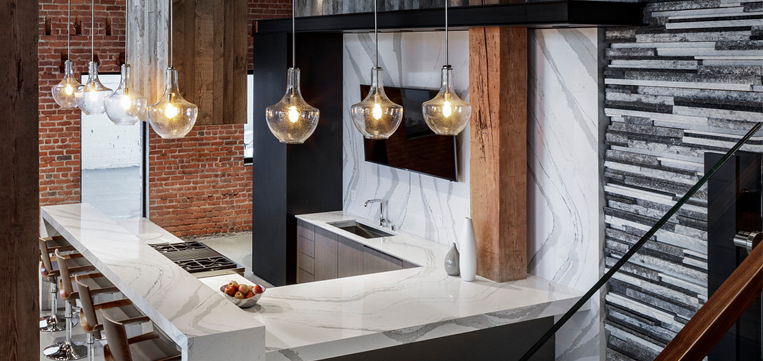When designing or renovating a home, choosing an appropriate natural stone material for countertops and other surfaces is crucial. There are a number of options on the market that vary in price, durability, and style, including:
- Granite
- Marble
- Quartzite
- Soapstone
- Onyx
- Quartz
- Porcelain
- Solid surface
The choices can be overwhelming, but there are key differences that can help you pick the perfect material for the space in question. Check out the pros and cons of these top eight natural stone materials.
Granite: Durable and Widely Available
Granite is one of the most popular natural stone countertop surfaces on the market. It is available in thousands of patterns and colors and is also highly durable, making it a favorite of homeowners and installers alike. While it does need to be sealed annually, granite is very low maintenance and a great option for high-traffic spaces like kitchens and bathrooms.
Marble: Distinctive But High-Maintenance
Marble is a naturally-occurring stone with one-of-a-kind veins and features. However, it is much more porous in comparison to other natural stone countertop options and can scratch, stain, and scuff without regular sealing and cleaning. Its unrivaled beauty draws many people in, but it’s important to understand the maintenance marble countertops require and consider selecting the material for an appropriate location like a fireplace or stone kitchen backsplash.
Quartzite: Very Durable and UV-Resistant
Quartzite is a durable natural stone that can mimic the patterns and veining seen in marble. It is one of the strongest countertop materials available and with regular sealing is resistant to scratching and scorching. It is also UV resistant, making it a go-to choice for exterior applications like outdoor kitchens. The one downside is that quartzite is very rigid and can be more prone to denting and chipping than other natural stone options.
Soapstone: Non-Porous But Less Widely Available
Soapstone is a softer natural stone but it is much less porous than many other options. This means that while it may be prone to scratching, it is less likely to stain. Soapstone countertops come in a limited range of styles and colors including black, grey, green, and blue, which can be a deciding factor for many.
Onyx: Striking and Unique
Onyx is a rare and somewhat delicate natural stone choice, but its appearance is unrivaled by any other solid surface. It is available in a variety of unique colors and can even be translucent which makes for a distinctive look. Onyx is prone to scratching and is best used in low-traffic areas and vertical surfaces like a natural stone backsplash.
Quartz: Reliable and Low-Maintenance
Quartz is a man-made countertop option, so it isn’t technically considered natural stone. However, with its manufacturing comes the ability to create stunning veining and a unique array of colors. Quartz countertops are also very durable and require virtually no maintenance other than regular cleaning.
Porcelain: Sleek and Heat-Resistant
While porcelain is a less common countertop material, it has grown immensely in popularity over the past few years. It is extremely heat resistant and doesn’t require any sealing or maintenance outside of routine cleaning. Porcelain is thinner than many other natural stone options, so your choices in terms of edge profile may be limited. For this reason, it is often installed on vertical surfaces like showers and backsplashes.
Solid Surface: Affordable and Low-Maintenance
Solid surface is an engineered material made of plastic resin, meaning it scratches and scorches more easily than many of the other natural stone options. However, it is also extremely non-porous and requires no sealing or additional maintenance. It is also significantly more affordable than most other countertop materials.
The Bottom Line: What Is the Best Natural Stone for Countertops?
When selecting the best natural stone for your project, you’ll need to consider the application. Many times, durability comes first. But sometimes the sheer beauty of marble or onyx make them the only option. Here’s our side by side comparison of the top eight natural stone options on the market.
| Material | Cost | Durability | Natural vs. Man-Made | Ideal Application |
| Granite | $$$ | High | Natural | High-traffic surfaces |
| Marble | $$ | Low | Natural | Backsplashes, low-traffic decorative applications |
| Quartzite | $$$ | High | Man-Made | High-traffic surfaces |
| Soapstone | $$ | Medium | Natural | Medical and chemical use surfaces |
| Onyx | $$$$ | Low | Natural | Decorative applications |
| Quartz | $$$ | High | Man-Made | High-traffic surfaces |
| Porcelain | $$ | High | Man-Made | Vertical applications |
| Solid Surface | $ | Medium | Man-Made | Large scale installations and projects with tight budgets |
Looking for more guidance on which natural stone material is best for your project? Classic Rock can help. Contact us to get started.

